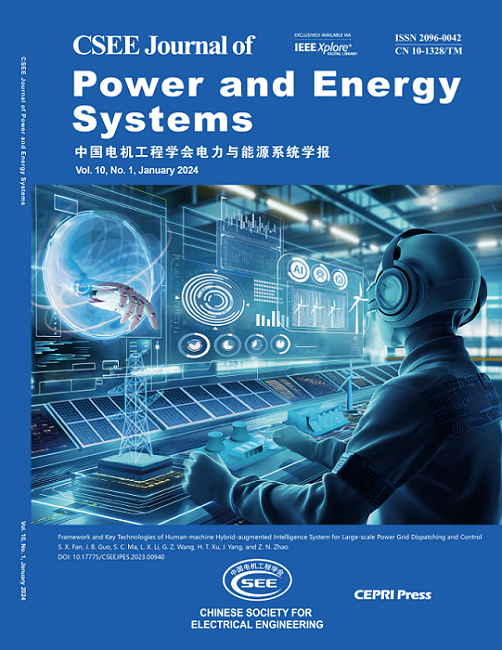Security Constrained Distributed Transaction Model for Multiple Prosumers
IF 6.9
2区 工程技术
Q2 ENERGY & FUELS
引用次数: 0
Abstract
Massive access of renewable energy has prompted demand-side distributed resources to participate in regulation and improve flexibility of power systems. With large-scale access of massive, decentralized, and diverse distributed resources, demand-side market members have transformed from traditional “consumers” to “prosumers”. To explore the distributed transaction model of prosumers, in this paper, a multi-prosumer distributed transaction model is proposed, and the Conditional Value-at-Risk (CVaR) theory is applied to quantify potential risks caused by the stochastic characteristics inherited from renewable energy. First, a prosumer model under constraints of the distribution network including photovoltaic units, fuel cells, energy storage system, central air conditioning and flexible loads is established, and a multi-prosumer distributed transaction strategy is proposed to achieve power sharing among multiple prosumers. Second, a prosumer transaction model based on CVaR is constructed to measure risks inherited from the uncertainty of PV output within the prosumer and ensure safety of system operation in extreme PV output scenarios. Then, the alternating direction multiplier method (ADMM) is utilized to solve the constructed model efficiently. Finally, distributed transaction costs of prosumers are distributed fairly based on the generalized Nash equilibrium to maximize social benefits. Simulation results show the multi-prosumer distributed transaction mechanism established under the proposed generalized Nash equilibrium method can encourage power sharing among prosumers, increasing their own income and social benefits. Also, the CVaR can assist decision making of prosumers in weighting the risks and benefits, improving system resilience through energy management of prosumers.面向多个消费者的安全受限分布式交易模型
可再生能源的大规模接入促使需求侧分布式资源参与调节,提高电力系统的灵活性。随着海量、分散、多样的分布式资源大规模接入,需求侧市场成员从传统的 "消费者 "转变为 "消费者"。为探索 "准消费者 "的分布式交易模式,本文提出了一种多 "准消费者 "分布式交易模型,并应用条件风险价值(CVaR)理论量化了可再生能源固有的随机特性所带来的潜在风险。首先,建立了配电网约束下的用户模型,包括光伏发电单元、燃料电池、储能系统、中央空调和柔性负载,并提出了多用户分布式交易策略,以实现多个用户之间的电力共享。其次,构建了基于 CVaR 的用户交易模型,以衡量用户内部光伏输出不确定性带来的风险,确保极端光伏输出情况下的系统运行安全。然后,利用交替方向乘法(ADMM)对所建模型进行高效求解。最后,基于广义纳什均衡公平地分配了准消费者的分布式交易成本,以实现社会效益最大化。仿真结果表明,在所提出的广义纳什均衡方法下建立的多消费者分布式交易机制能够促进消费者之间的权力共享,增加消费者自身的收入和社会效益。此外,CVaR 还能帮助消费者在权衡风险和收益时做出决策,通过消费者的能源管理提高系统的弹性。
本文章由计算机程序翻译,如有差异,请以英文原文为准。
求助全文
约1分钟内获得全文
求助全文
来源期刊

CSEE Journal of Power and Energy Systems
Energy-Energy (all)
CiteScore
11.80
自引率
12.70%
发文量
389
审稿时长
26 weeks
期刊介绍:
The CSEE Journal of Power and Energy Systems (JPES) is an international bimonthly journal published by the Chinese Society for Electrical Engineering (CSEE) in collaboration with CEPRI (China Electric Power Research Institute) and IEEE (The Institute of Electrical and Electronics Engineers) Inc. Indexed by SCI, Scopus, INSPEC, CSAD (Chinese Science Abstracts Database), DOAJ, and ProQuest, it serves as a platform for reporting cutting-edge theories, methods, technologies, and applications shaping the development of power systems in energy transition. The journal offers authors an international platform to enhance the reach and impact of their contributions.
 求助内容:
求助内容: 应助结果提醒方式:
应助结果提醒方式:


